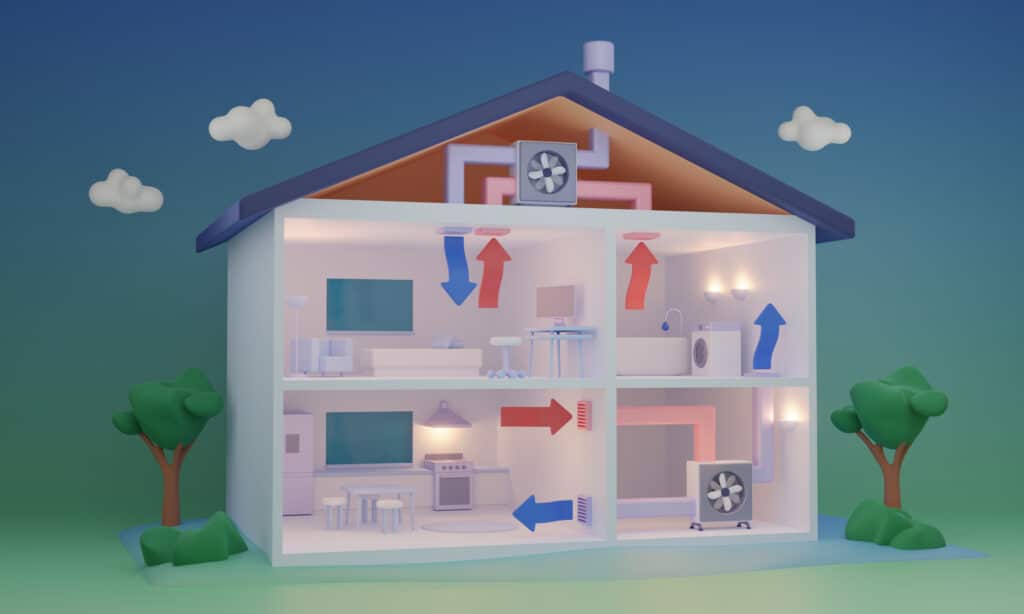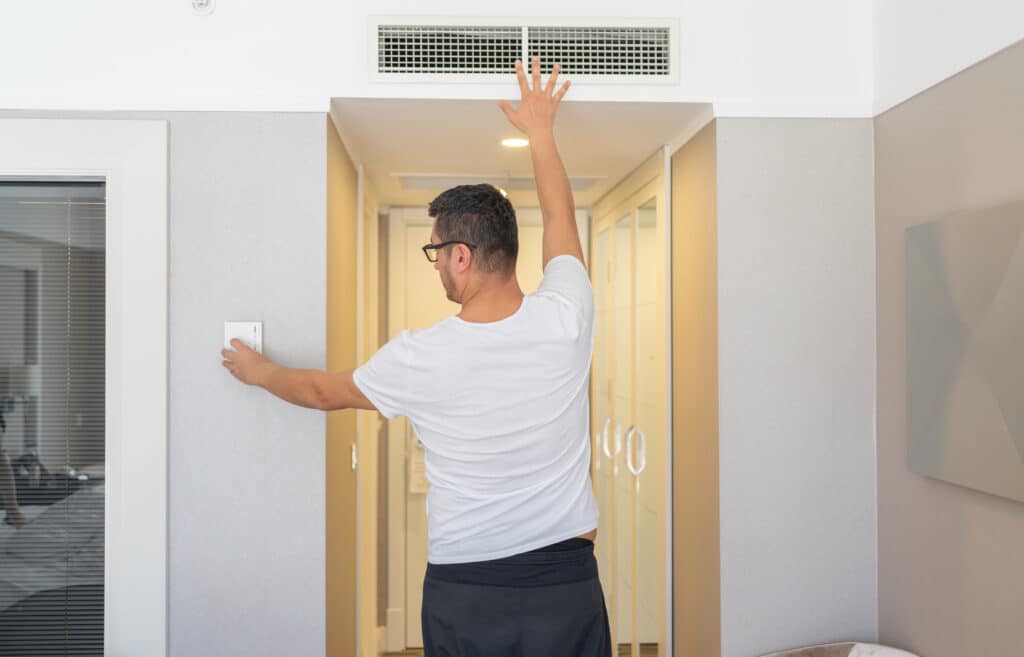
Sleep Soundly: How HVAC Systems Affect Rest
Did you know that your HVAC system can impact how well you sleep?
HVAC systems, or heating, ventilation, and air conditioning systems, are vital for maintaining indoor comfort. They regulate temperature, humidity, and air quality, all of which are crucial for a good night’s sleep.
Sleep quality is essential for overall health and well-being. Poor sleep can lead to various health issues, including stress, reduced cognitive function, and weakened immune response. Therefore, understanding how HVAC systems affect sleep is key to creating a restful sleep environment.
HVAC systems consist of several components working together. The thermostat controls the temperature, while the furnace and air conditioner manage heating and cooling. The heat pump is a versatile component that can both heat and cool your home. These parts interact to keep your indoor climate stable and comfortable.

How HVAC Systems Work
HVAC systems are composed of several key components that work together to regulate your indoor climate. Understanding these components can help you appreciate how your system contributes to a comfortable and restful environment.
At the heart of every HVAC system is the thermostat. This device monitors the indoor temperature and signals the HVAC system to adjust heating or cooling to maintain the desired setting. The thermostat is the control center, ensuring that your home remains at a comfortable temperature.
The furnace is responsible for heating your home. It burns fuel (natural gas, oil, or electricity) to generate heat, which is then distributed through your home via ductwork. The furnace is essential during colder months to keep your indoor environment warm and cozy.
In contrast, the air conditioner cools your home by removing heat from the indoor air. It uses a refrigerant cycle to absorb heat inside and release it outside, blowing cool air through the ducts. This component is crucial during hot weather, helping to maintain a pleasant indoor temperature.
A heat pump is a versatile component that can both heat and cool your home. In heating mode, it extracts heat from the outside air (even in cold weather) and transfers it indoors. In cooling mode, it functions like an air conditioner, removing heat from the inside and releasing it outside.
The Impact of Temperature on Sleep
Did you know the right temperature can help you sleep better? Maintaining an optimal sleeping temperature is essential for high-quality rest. Your HVAC system plays a crucial role in regulating indoor temperatures, ensuring you stay comfortable throughout the night.
Experts suggest that the ideal sleeping temperature ranges between 60-67°F (15-19°C). This range helps your body maintain its natural thermoregulation process, promoting deeper and more restorative sleep. If the temperature is too high or too low, you may experience restlessness and frequent wake-ups.
Your HVAC system can help achieve these optimal temperatures. The thermostat allows you to set your desired temperature, ensuring your home stays within the ideal range. Whether it’s the middle of summer or the depths of winter, your HVAC system adjusts to provide consistent comfort.
Air conditioners are particularly valuable during hot weather. They remove excess heat and humidity from the air, creating a cool and pleasant environment. By setting your thermostat to the recommended sleeping temperature, you can avoid the discomfort of a hot, stuffy bedroom.
In colder months, the furnace steps in to provide warmth. By maintaining a steady indoor temperature, your furnace prevents the chill that can disrupt sleep. Modern HVAC systems often include programmable thermostats, allowing you to set different temperatures for day and night. This feature ensures that your bedroom is always at the perfect temperature for sleep.
For those living in regions with fluctuating temperatures, a heat pump offers versatility. It can both heat and cool your home, adapting to seasonal changes and maintaining a consistent indoor climate. This adaptability is key to achieving the optimal sleep temperature year-round.
Humidity Levels and Sleep Comfort
Humidity plays a significant role in sleep comfort, and your HVAC system can help regulate it. Maintaining the right humidity levels ensures a pleasant sleeping environment, free from the discomforts of overly dry or excessively humid air.
Optimal humidity levels for sleep typically range from 30% to 50%. When the air is too dry, it can cause irritation in your nasal passages and throat, leading to restless sleep and even respiratory issues. Conversely, high humidity can make the air feel heavy and warm, causing discomfort and making it harder for your body to cool down.
Your HVAC system is equipped to manage humidity levels effectively. Air conditioners not only cool the air but also remove excess moisture, reducing indoor humidity during hot, sticky weather. This dehumidification process helps maintain a comfortable environment conducive to sleep.
In contrast, during colder months, the air tends to be drier. Using your furnace can exacerbate this dryness, potentially leading to dry skin, irritated sinuses, and other discomforts that disrupt sleep. Many modern HVAC systems include humidifiers, which add moisture to the air, maintaining a balanced humidity level.
Dehumidifiers can be integrated into your HVAC system to manage excess moisture, particularly in humid climates. These devices work alongside your air conditioner to keep humidity in check, ensuring the air remains comfortable and reducing the risk of mold growth and allergens that can affect sleep quality.
Air Quality and Sleep Health
How clean is the air you’re breathing while you sleep? The quality of the air in your home significantly impacts your sleep health. HVAC systems play a crucial role in filtering and purifying the air, ensuring you breathe clean, fresh air throughout the night.
Indoor air quality can be compromised by various pollutants, including dust, pollen, pet dander, mold spores, and even household chemicals. These contaminants can exacerbate allergies, asthma, and other respiratory conditions, making it difficult to achieve restful sleep.
Modern HVAC systems are designed with air filters that trap these particles, preventing them from circulating in your home. High-efficiency particulate air (HEPA) filters are particularly effective, capturing up to 99.97% of airborne particles. By regularly replacing or cleaning these filters, you can ensure your HVAC system continues to provide clean air.
Additionally, many HVAC systems now include air purifiers. These devices use advanced technologies, such as ultraviolet (UV) light and ionization, to neutralize bacteria, viruses, and other pathogens. This added layer of protection helps reduce the risk of illness and promotes better respiratory health, contributing to improved sleep quality.
Another crucial aspect of air quality is ventilation. Proper ventilation ensures a continuous exchange of indoor and outdoor air, reducing the concentration of indoor pollutants. Your HVAC system’s ventilation component helps expel stale air and bring in fresh, clean air, enhancing the overall air quality in your home.
For individuals with severe allergies or respiratory conditions, whole-house air purification systems can be integrated with your HVAC system. These comprehensive systems offer robust filtration and purification, ensuring the air throughout your home remains consistently clean and healthy.
Noise Levels of HVAC Systems
Is your HVAC system keeping you up at night? Noise levels can significantly impact sleep quality. While HVAC systems are essential for maintaining a comfortable indoor environment, the noise they produce can be a source of disturbance, preventing you from getting the restful sleep you need.
The hum, buzz, or clank of an HVAC system can be disruptive, especially if it cycles on and off frequently during the night. Noise from HVAC systems can come from various sources, including the compressor, blower, and ductwork. Understanding these sources can help you choose a quieter system and enjoy a more peaceful sleep environment.
Compressor noise is often the loudest and most noticeable sound. It occurs when the air conditioner or heat pump is running. Modern HVAC systems are designed with quieter compressors, utilizing advanced technology to minimize operational noise.
Blower noise is another common issue. The blower circulates air throughout your home and can produce a noticeable sound, especially if the system is running at high speed. Variable-speed blowers can help reduce noise by operating at lower speeds when full power isn’t needed.
Ductwork noise can result from the expansion and contraction of metal ducts or from air moving through the ducts at high speeds. Insulating your ductwork can help dampen these sounds, creating a quieter environment.
When selecting an HVAC system, consider models specifically designed for quiet operation. Quieter systems often feature sound-dampening materials and advanced engineering to minimize noise. Look for systems with a low sound rating (measured in decibels) to ensure a quieter experience.
Smart thermostats can also play a role in reducing HVAC noise. By programming your thermostat to maintain a consistent temperature, you can minimize the frequency of system cycling, which reduces the noise associated with turning the system on and off.
Energy Efficiency and Cost Savings
Did you know an energy-efficient HVAC system can save you money while you sleep better? Energy efficiency in HVAC systems is not just about being environmentally friendly—it also plays a crucial role in maintaining a comfortable sleep environment and reducing energy costs.
Modern HVAC systems are designed with energy efficiency in mind. These systems use advanced technology to control consistent temperature while consuming less energy. An energy-efficient HVAC system can significantly reduce your utility bills, especially when used effectively.
One of the primary features of energy-efficient HVAC systems is the SEER (Seasonal Energy Efficiency Ratio) rating. The higher the SEER rating, the more efficient the system. Choosing an HVAC system with a high SEER rating ensures better performance with lower energy consumption, leading to cost savings over time.
Programmable thermostats and smart thermostats are excellent tools for enhancing energy efficiency. These devices allow you to set specific temperature schedules that align with your daily routines. For example, you can lower the temperature at night for better sleep and increase it slightly during the day when you’re active. This targeted heating and cooling reduces energy waste and lowers your energy bills.
Variable-speed motors in modern HVAC systems also contribute to energy efficiency. Unlike traditional motors that operate at full speed regardless of demand, variable-speed motors adjust their speed based on the heating or cooling requirements. This results in more consistent temperatures, less energy usage, and quieter operation.
Regular maintenance is key to ensuring your HVAC system operates efficiently. Simple tasks like replacing air filters, cleaning ducts, and scheduling annual inspections can prevent your system from overworking and wasting energy. A well-maintained HVAC system performs better, lasts longer, and consumes less energy.
Zoning systems can further enhance energy efficiency by allowing you to control temperatures in different areas of your home independently. By heating or cooling only the rooms you use, you can avoid wasting energy on unoccupied spaces. This tailored approach ensures comfort where you need it and saves energy.
Seasonal Adjustments for Optimal Sleep
How do you sleep comfortably through changing seasons? Adjusting your HVAC settings for different seasons ensures that your home remains comfortable year-round, promoting better sleep. Each season brings its own challenges, and fine-tuning your HVAC system can help you maintain the ideal sleeping environment regardless of the weather outside.
During winter, keeping your home warm is essential. However, overheating can disrupt sleep. The ideal bedroom temperature for sleep is between 60-67°F (15-19°C), so setting your thermostat within this range can help. Additionally, using humidifiers can counteract the dry winter air produced by your heating system, preventing dry skin and respiratory discomfort.
In the summer, high temperatures and humidity can make it difficult to sleep. Your air conditioner is your best friend during this time. Setting your thermostat to cool your home to the optimal sleeping temperature before bed can make a significant difference. Using dehumidifiers can also help maintain comfort by reducing moisture in the air.
Spring and fall, known as transitional seasons, can be tricky due to fluctuating temperatures. This is where a heat pump shines, as it can efficiently switch between heating and cooling. Programming your thermostat to adjust for daily temperature variations ensures your home stays comfortable, preventing any disruption to your sleep.
HVAC Systems and Sleep in The Colony, TX
How can you sleep better in The Colony, TX with the right HVAC system? The local climate in The Colony, TX, presents unique challenges that can impact your sleep quality. Understanding these specific considerations can help you choose the best HVAC system for your home and ensure a comfortable sleep environment year-round.
Specific Considerations for The Colony, TX Climate
The Colony, TX, experiences a humid subtropical climate characterized by hot summers, mild winters, and significant humidity levels throughout the year. These conditions require an HVAC system that can effectively manage temperature and humidity to maintain a comfortable indoor environment.
- Hot Summers: During summer, temperatures in The Colony often exceed 90°F (32°C). High humidity levels can make these temperatures feel even more uncomfortable, leading to restless nights. A reliable air conditioning system is essential to keep your home cool and maintain an ideal sleeping temperature.
- Mild Winters: Winters in The Colony are generally mild, with average lows around 40°F (4°C). While heating needs are less demanding, an efficient furnace or heat pump is necessary to ensure comfort during cooler nights.
- High Humidity: Humidity levels in The Colony can be high year-round, particularly in the summer. This moisture can affect indoor comfort and sleep quality. Your HVAC system should include dehumidification features to control indoor humidity effectively.

FAQs
-
How can I reduce the noise from my HVAC system to improve sleep quality?
Regular maintenance, such as tightening loose components and cleaning ducts, can help reduce noise. Additionally, investing in a quieter HVAC system with a low decibel rating can minimize disruptions during the night.
-
What is the ideal temperature for sleeping, and how can my HVAC system help?
The ideal sleeping temperature is between 60-67°F (15-19°C). You can set your thermostat to this range to ensure a comfortable sleep environment. Smart thermostats allow for precise control and can maintain these temperatures automatically.
-
How often should I replace HVAC filters to maintain good air quality for sleep?
It’s recommended to replace HVAC filters every 1-3 months. Regular replacement ensures good airflow and air quality, reducing allergens and pollutants that can disrupt sleep.
-
Can a smart thermostat really improve my sleep?
Yes, a smart thermostat can learn your sleep schedule and adjust the temperature accordingly. It can lower the temperature at night for better sleep and increase it in the morning for comfort, ensuring a consistent and ideal sleep environment.
-
How do I know if my HVAC system needs an upgrade to improve sleep quality?
Signs that you may need an upgrade include frequent repairs, inconsistent temperatures, high energy bills, and an old system (over 10-15 years). An upgraded system can provide better temperature control, quieter operation, and improved energy efficiency.
Whether through seasonal adjustments, regular maintenance, or upgrading to a more efficient system, taking care of your HVAC system is a step toward better health and well-being.







